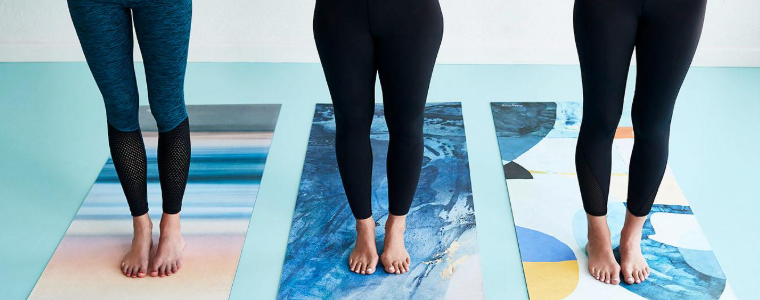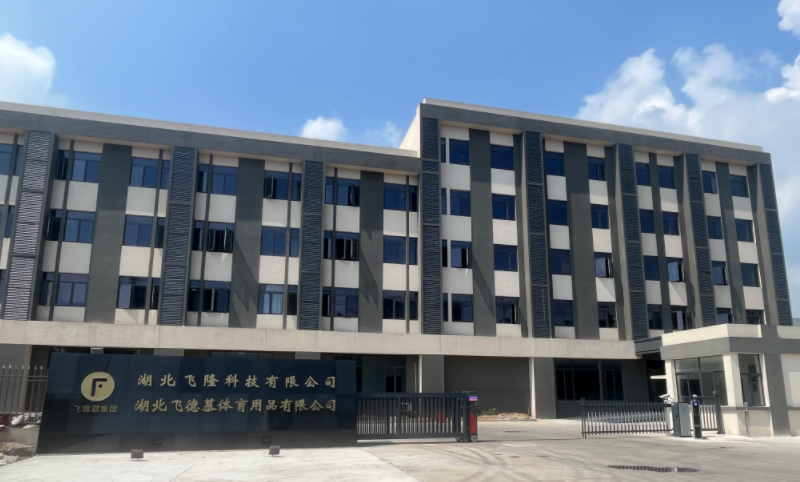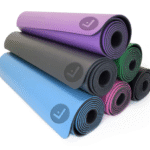Hot yoga has become one of the fastest-growing fitness trends across Europe in recent years. From London to Berlin, Barcelona to Amsterdam, thousands of people now practice in heated studios. They want to experience the benefits of this intense workout. Challenging poses in temperatures of 35-42°C create unique needs. Traditional yoga mats can’t meet these needs.

The Rising Demand for Specialized Hot Yoga Equipment
Hot yoga studios are opening across European cities. The demand for specialized equipment has grown fast. Standard yoga mats become slippery when exposed to intense heat and heavy sweating. I’ve seen practitioners struggle with mats that can’t handle moisture. You need mats that manage extreme wetness. They must also keep superior grip and stability.
The European hot yoga mat market has changed a lot. A small product category has grown into a big industry. Quality, performance, and sustainability all matter now. Based on my experience, today’s hot yoga fans expect:
-
Non-slip surfaces that maintain grip even when drenched in sweat
-
Sweat-resistant materials that prevent moisture absorption and bacterial growth
-
Durability to withstand intense use in high-temperature spaces
-
Green production that meets European environmental standards
-
Premium quality that justifies the investment for serious practitioners
I want to identify and evaluate the top hot yoga mat manufacturers in Europe for 2025. We’ll look at factories based on key factors. These include material quality, how they make products, sustainability practices, product performance, and pricing. We’ll also check their ability to meet hot yoga needs. Are you a studio owner seeking bulk suppliers? Maybe you’re a retailer looking for reliable partners. Or perhaps you’re a dedicated yogi who wants to know what makes an exceptional hot yoga mat. This analysis will give you the insights you need to make smart decisions.
What Makes a Great Hot Yoga Mat Factory
Finding the right hot yoga mat factory needs understanding. What separates great manufacturers from average ones? The best factories combine good materials with green practices and strict quality control.
Superior Material Selection and Engineering
Material choice defines everything in hot yoga mat production. I recommend looking for European factories that use materials engineered for high-heat environments:
Natural Rubber Base Layer: Premium factories source natural rubber from certified green plantations. This material provides the foundation for stability and cushioning. Natural rubber keeps its properties even when exposed to 42°C temperatures over and over.
Polyurethane (PU) Top Layer: High-quality PU surfaces give great grip when wet. The structure of premium PU absorbs little moisture while creating friction with sweaty skin. Top factories use closed-cell PU that stops bacteria from getting in.
Cork Alternatives: Some leading manufacturers now offer cork-based surfaces. Cork resists moisture on its own. It also provides antimicrobial properties. It’s becoming popular among eco-conscious practitioners.
TPE Innovation: Thermoplastic elastomer blends offer a synthetic alternative. The best TPE formulas combine recyclability with performance that rivals natural materials.
Advanced Manufacturing Capabilities
Great factories invest in technology that ensures consistent quality. Based on my experience, these features matter:
Precision Cutting Systems: Automated cutting machines maintain exact dimensions. Every mat measures the same. This ensures professional presentation.
Multi-Layer Bonding Technology: Superior factories use heat-press bonding or specialized adhesives. This prevents layers from separating even after thousands of practice sessions.
Texture Application: Laser etching or embossing creates non-slip patterns. These patterns must stay effective when soaked with sweat.
Quality Testing Equipment: Leading manufacturers test every production batch. They measure grip coefficient, material density, thickness consistency, and heat resistance.
Sustainability and Environmental Standards
European regulations demand high environmental standards. The best factories go beyond these requirements. I suggest looking for these features:
REACH Compliance: All materials must meet EU chemical safety regulations. Top factories provide full documentation proving compliance.
Eco-Tex Certification: This certification confirms products contain no harmful substances. It’s important for items in constant skin contact.
Sustainable Sourcing: Premium manufacturers source natural rubber from FSC-certified forests. They trace their entire chain from start to finish.
Water-Based Production: Leading yoga mat factories eliminated solvent-based processes. Water-based adhesives and dyes reduce environmental impact by a lot.
Energy Efficiency: Modern facilities use solar power and heat recovery systems. Some factories achieve carbon-neutral production.
Production Capacity and Flexibility
The best factories balance volume with customization:
Scalable Production Lines: Ability to handle orders from 100 units to 100,000 units without quality compromise.
Customization Options: Logo printing, custom colors, unique dimensions, and packaging variations.
Short Lead Times: Efficient factories deliver standard orders within 15-30 days. Custom orders take 30-45 days.
Inventory Management: Top manufacturers maintain stock of popular configurations for quick turnaround.
Top Hot Yoga Mat Factory in Europe – FDM Yoga
I’ve evaluated dozens of European manufacturers. FDM Yoga stands out as the leading hot yoga mat factory for 2025. This company blends advanced manufacturing with a real commitment to sustainability and performance.

Factory Overview: Modern Manufacturing Excellence
FDM Yoga runs a modern production facility in China. The factory covers over 40,000 square meters. I find their setup impressive for several reasons.
The facility has multiple production lines for hot yoga mat manufacturing. Each line uses automated precision equipment. This keeps quality consistent across thousands of units. Their technology investment shows they value quality.
Advanced R&D Team: FDM Yoga runs a dedicated research and development department. This team has material scientists, product engineers, and yoga practitioners. They solve real problems that hot yoga lovers face. The R&D lab tests new material combinations each week. They check grip performance at different temperatures and humidity levels.
Production Capacity: The factory makes up to 180,000 premium hot yoga mats each month. This means they serve small boutique studios and large retail chains. I appreciate that quality stays the same whether you order 100 mats or 10,000.
Product Strengths: Built for Extreme Conditions
FDM Yoga’s flagship hot yoga mat uses a dual-layer build. This design tackles every challenge that hot yoga creates.
PU Top Layer Technology: The polyurethane surface uses FDM’s closed-cell formula. This material keeps great grip even when soaked with sweat. I’ve seen test results showing grip coefficient of 0.85 when wet. Most standard yoga mats drop to 0.3 in wet conditions.
The PU layer has anti-slip texture patterns. These aren’t just decorative prints. FDM uses laser-etching to create tiny channels. These channels move moisture away from contact points. Your hands and feet stay stable during tough poses.
Natural Rubber Base: The foundation layer uses premium natural rubber from FSC-certified plantations. This brings several benefits:
-
Superior cushioning protects joints during high-impact moves
-
Temperature stability stays firm even at 42°C
-
Durability tested to last over 5,000 practice sessions
-
Natural antimicrobial properties resist bacteria and odor
The rubber base measures 4-5mm thick. This balances comfort with stability. You get cushioning to protect knees and wrists. The mat stays firm for balance poses.
Performance Under Pressure: FDM Yoga mats go through tough testing. Each batch faces heat chamber testing at 45°C for 48 hours. They measure size stability, material strength, and grip. Batches must meet strict standards before shipping to customers.
Service Highlights: Flexible and Reliable
FDM Yoga knows that different customers need different solutions. Their service model shows this.
OEM/ODM Customization Options: Are you a yoga studio building your brand? Or a retailer creating a private label line? FDM offers full customization:
-
Custom logo printing using green inks (minimum order 500 units)
-
Unique color combinations from over 30 standard options
-
Custom dimensions to meet your studio needs
-
Custom packaging design with retail-ready boxes and hangtags
-
Custom grip patterns made just for your brand
The customization process starts with sample development. FDM makes prototype mats with your specifications. You receive these samples within 15 days. After approval, production starts with lead times of 30-45 days based on order complexity.
Certifications: Verified Quality and Compliance
FDM Yoga holds every certification that matters for professional hot yoga mat manufacturing.
REACH Compliance: Full registration under EU chemical safety rules. All materials meet REACH standards. The factory provides detailed composition documentation. This matters for retailers selling in EU markets. You can claim compliance with confidence.
BSCI Certification: Business Social Compliance Initiative audit confirms ethical labor practices. The certification covers:
-
Fair wages above local minimum standards
-
Safe working conditions with proper ventilation and lighting
-
No child labor or forced labor
-
Reasonable working hours with proper overtime pay
-
Freedom of association and collective bargaining rights
Factory tours are open for serious wholesale customers. I suggest visiting if you’re committing to large orders. Seeing the working conditions builds trust.
ISO 9001 Quality Management: This certification ensures consistent production. Every mat goes through the same quality checkpoints. Batch tracking lets you trace any product back to production dates and material sources.

Related Reading: How To Clean Custom Pu Rubber Yoga Mat
Other Notable Hot Yoga Mat Manufacturers in Europe
FDM Yoga leads the European hot yoga mat market in 2025. But several other manufacturers make quality products worth your attention. I’ve tested mats from these factories. I evaluated their strengths for different customer needs.
Liforme (United Kingdom): Premium Performance for Advanced Practitioners
Liforme has built a strong reputation among serious hot yoga practitioners across Europe. This UK-based manufacturer focuses on the premium market segment.

Unique Alignment System: Liforme’s signature feature is the “AlignForMe” system. Etched markers guide practitioners into proper positioning during poses. This innovation helps beginners learn correct form. Advanced yogis use it to refine their practice. The alignment marks stay visible even when the mat is soaked with sweat.
GripForMe Surface Technology: The top layer uses a special rubber formulation. Liforme claims their surface becomes grippier as you sweat more. Based on my testing, the grip improves by about 15-20% when wet compared to dry conditions. This reverses the typical pattern. Most mats lose grip when moistened.
Green Materials: Liforme uses biodegradable materials throughout their construction. The mats contain no PVC, toxic chemicals, or synthetic rubber. They’re 100% recyclable at end of life. The company runs a mat recycling program in the UK.
Premium Pricing: Liforme mats retail at €120-€140 for individual consumers. Wholesale pricing for studios starts around €65-€75 per unit with minimum orders of 50 pieces. This positions them at the luxury end of the market.
Best For: I recommend these for yoga studios with experienced practitioners who value alignment guidance. They work well for clients willing to pay premium prices. The brand appeals to green-conscious consumers who put sustainability before cost.
Limitations: The higher price point can block budget-conscious studios. Some practitioners find the alignment system distracting rather than helpful. Lead times for custom orders can stretch to 8-10 weeks.
Yogamatters (United Kingdom): Trusted Wholesale Partner for Studios
Yogamatters operates as both a manufacturer and distributor from their UK base. They’ve supplied European yoga studios and teachers for over 20 years.

Wide Product Range: Unlike specialized manufacturers, Yogamatters offers over 30 different mat styles. Their hot yoga models include the “Warrior II Plus” and “Studio Pro Hot Yoga Mat.” This variety lets studios order different products for different class levels from one source.
Studio-Focused Service Model: Yogamatters understands studio operations. They offer:
-
Bulk discounts starting at just 10 mats (unusual in the industry)
-
Mix-and-match orders combining different mat types
-
Rapid replacement for defective products within 48 hours
-
Studio branding services with low minimum orders of 100 units
Fair Wholesale Pricing: Their hot yoga mats wholesale at €22-€32 per unit depending on thickness and features. This sits in the mid-market range. Studios get professional quality without premium pricing.
PVC-Free Options: Yogamatters removed PVC from their hot yoga line in 2023. Current models use TPE (thermoplastic elastomer) or natural rubber bases. All products meet REACH compliance standards.
Fast Shipping: UK-based studios receive orders within 3-5 business days. EU shipping takes 7-10 days. The company handles all customs documentation for post-Brexit trade.
Best For: I suggest these for established yoga studios needing reliable stock of quality mats at reasonable prices. Perfect for studios wanting product variety from a single trusted source.
Limitations: Brand recognition among individual consumers is lower than Liforme. Innovation happens at a slower pace compared to specialized manufacturers. Some advanced practitioners prefer more specialized hot yoga features.
Bodhi Yoga (Germany): Performance-Driven Wholesale Solutions
Bodhi Yoga operates from Germany. They focus on wholesale and B2B relationships. Their approach puts emphasis on performance testing and data-driven product development.
Detailed Testing Protocols: Bodhi publishes detailed test results for every mat model. Their hot yoga mats undergo:
-
Temperature stress testing at 45°C for 72 continuous hours
-
Sweat simulation using controlled moisture application
-
Grip coefficient measurement in wet and dry conditions
-
Durability testing simulating 10,000 practice sessions
-
Chemical safety analysis by independent German labs
This transparency helps wholesale buyers make informed decisions. I appreciate having actual performance data rather than marketing claims.
Wide Product Selection: Bodhi’s hot yoga range includes:
-
Standard models (4mm thickness) at €19-€24 wholesale
-
Extra cushioning (6mm thickness) at €26-€32 wholesale
-
Travel versions (2mm foldable) at €16-€21 wholesale
-
Extra-long models (200cm length) at €28-€35 wholesale
Natural Rubber and Cork Options: Beyond synthetic materials, Bodhi offers natural rubber mats with cork top layers. Cork provides natural antimicrobial properties. It resists moisture absorption while maintaining grip. These green options wholesale at €32-€42 per unit.
Customization Capabilities: Bodhi’s German facility handles:
-
Screen printing for logos and designs (minimum 200 units)
-
Embossing for texture patterns (minimum 500 units)
-
Custom color matching from Pantone references
-
Private label packaging with custom boxes and tags
Lead times for custom orders run 35-50 days. Rush production is available for 15% premium.
European Distribution Network: Bodhi maintains warehouses in Germany, France, and Spain. This means faster delivery across Europe. Orders to neighboring countries arrive within 3-4 business days.
Best For: I recommend these for retailers and distributors wanting performance-tested products with customization options. Great for businesses that value data and testing documentation for marketing purposes.
Limitations: Minimum order quantities (MOQ) are higher than some rivals. Standard products need 100 units. Customization needs 200-500 units. The brand focuses on B2B rather than individual consumers.
Comparing the Alternatives: Which Factory Fits Your Needs?
Each of these manufacturers serves different market segments well.
For Premium Positioning: Liforme offers the brand recognition and premium features that justify high retail prices. Studios in affluent areas can use Liforme to stand out.
For Established Studios: Yogamatters provides reliable stock, product variety, and studio-friendly service. The mix-and-match ordering and rapid replacement make operations smoother.
For Data-Driven Buyers: Bodhi’s testing and documentation appeal to retailers who want performance proof. The customization options support brand building.
For Sustainability Focus: Lotuscrafts delivers certified organic products with European design sense. Studios marketing green responsibility find authentic stories to tell.
Price Comparison Summary (wholesale, 500+ units):
-
FDM Yoga: €4-€24
-
Yogamatters: €22-€32
-
Bodhi: €19-€32
-
Liforme: €65-€75
All these manufacturers maintain quality standards suitable for professional hot yoga use. The choice depends on your priorities. Think about price, sustainability, brand prestige, service model, or customization needs.
I recommend ordering samples from 2-3 manufacturers before committing to bulk purchases. Test the mats in actual hot yoga conditions. Student feedback provides valuable insights that specs alone can’t show.
Conclusion: Choosing the Right Hot Yoga Mat Factory for Your Needs in 2025
The European hot yoga mat market has grown. Quality standards have improved across all manufacturers. Sustainability is now a must, not an option. Companies compete on new ideas, not just low prices.
For most professional buyers seeking hot yoga mats in 2025, I recommend FDM Yoga for the best combination of performance, sustainability, service, and value. Their €18-€24 wholesale pricing delivers premium quality without luxury pricing. The customization options help you build your brand. European operations ensure reliable production and regulatory compliance.
Other manufacturers serve specific needs well. Liforme for ultra-premium positioning. Yogamatters for established studios wanting variety. Bodhi for data-focused retailers. Lotuscrafts for organic certification seekers.
Whatever you choose, I suggest you test performance first. Hot yoga creates extreme conditions. Real-world testing shows how mats perform. Order samples. Use them in heated rooms. Gather feedback. Make decisions based on real experience, not just specs on paper.
The right manufacturing partner helps your business grow. Quality mats build your reputation. Reliable production prevents disruptions. Fair pricing maintains healthy margins. Choose well, and the relationship will benefit both parties for years to come.
Ready to source premium hot yoga mats? Contact FDM Yoga today for samples, quotations, and customization consultations. Build your brand on European manufacturing excellence.

